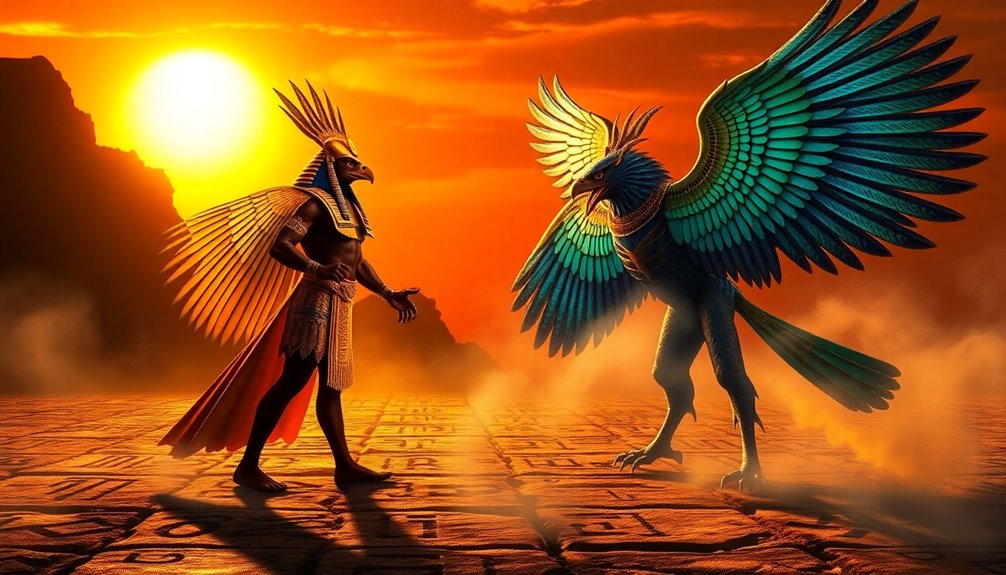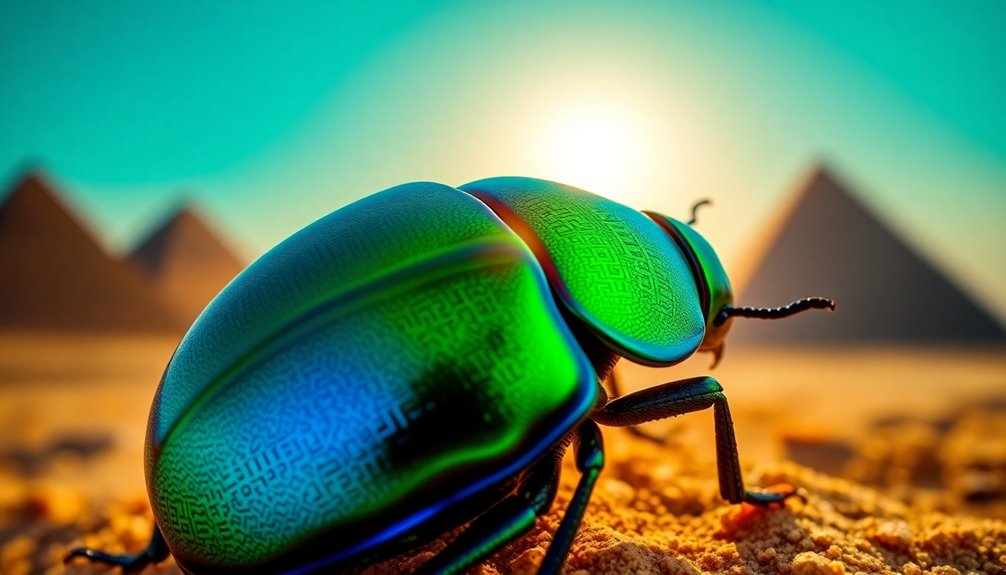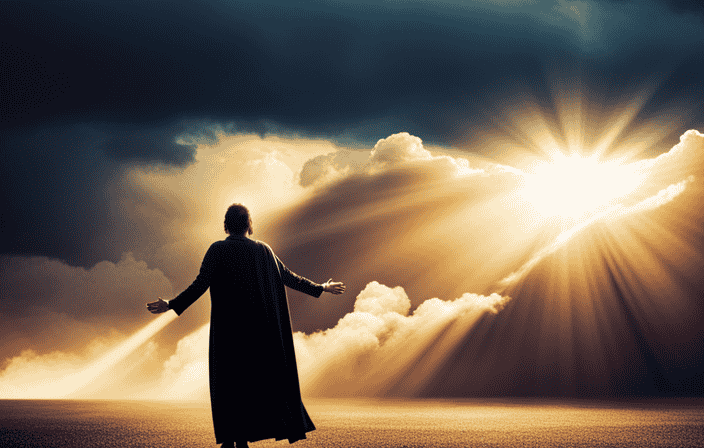When considering Ra and Horus, both are powerful gods holding essential secrets in ancient Egyptian mythology. Ra symbolizes creation and light, emerging from chaos to shape the world. His journey across the sky represents life itself. On the other hand, Horus, the falcon god, stands for kingship and protection, especially during ceremonies honoring pharaohs. Together, their symbolic eyes reflect cosmic duality, revealing deeper insights into justice and resurrection. Ultimately, the knowledge you seek about their intertwined legacies and secrets goes far deeper than it seems. Explore their rich stories to uncover what truly makes them powerful deities.
Key Takeaways
- Ra, as the sun god, embodies creation and light, representing the ultimate source of life and order in the universe.
- Horus symbolizes divine kingship and protection, holding power over the pharaohs and the concept of resurrection.
- The cosmic duality of their eyes signifies the balance between light (Ra) and power (Horus), revealing deeper truths about existence.
- Ra's emergence from chaos reflects his role as the creator, while Horus's vengeance for Osiris emphasizes justice and resurrection themes.
- Both deities hold significant secrets in the afterlife, guiding souls through the Book of the Dead, showcasing their intertwined legacies.
Origins of Ra and Horus
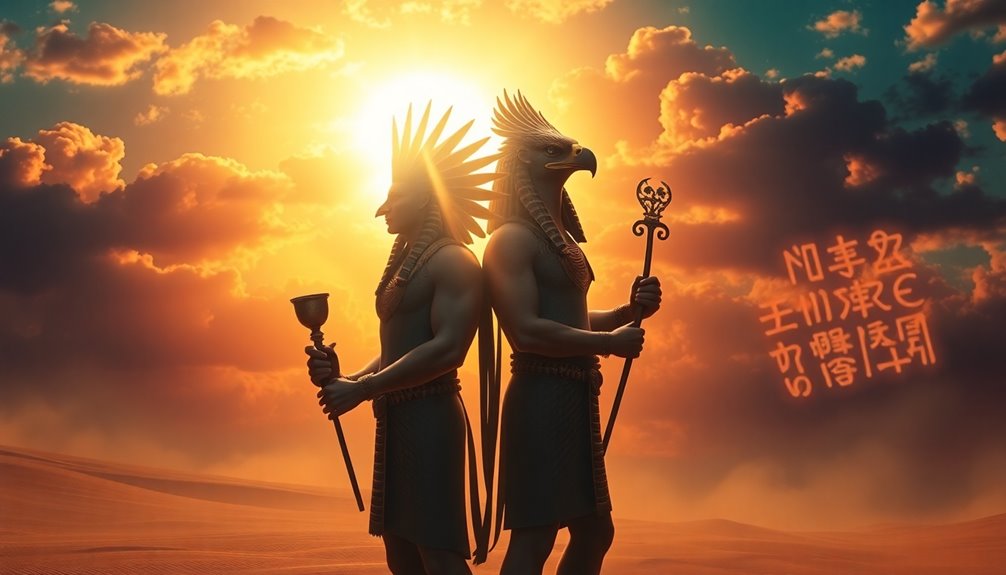
The origins of Ra and Horus are deeply intertwined in the tapestry of ancient Egyptian mythology, revealing how these deities came to symbolize vital aspects of life and governance.
Ra, primarily known as the sun god, emerged from chaos to create the world, traveling across the sky daily, embodying light and creation. In contrast, Horus, depicted as a falcon, represents the sky and divine kingship, serving as the protector of the pharaoh and symbolizing the struggle for order, particularly in avenging his father Osiris against Set.
Ancient Egyptians revered both gods, recognizing that Ra's daily journey across the heavens brought life, while Horus's protective nature secured stability and governance.
The Eye of Horus, a powerful symbol associated with Horus, represents protection and restoration, further emphasizing his role in the Egyptian pantheon. Meanwhile, Ra's imagery includes the sun disk and scarab beetle, reflecting his connection to rebirth and renewal.
Together, Ra and Horus illustrate the duality of creation and governance, showcasing how ancient Egyptians understood the balance between light and power, establishing a foundation for their beliefs and practices that endured for centuries.
Symbolism in Ancient Mythology
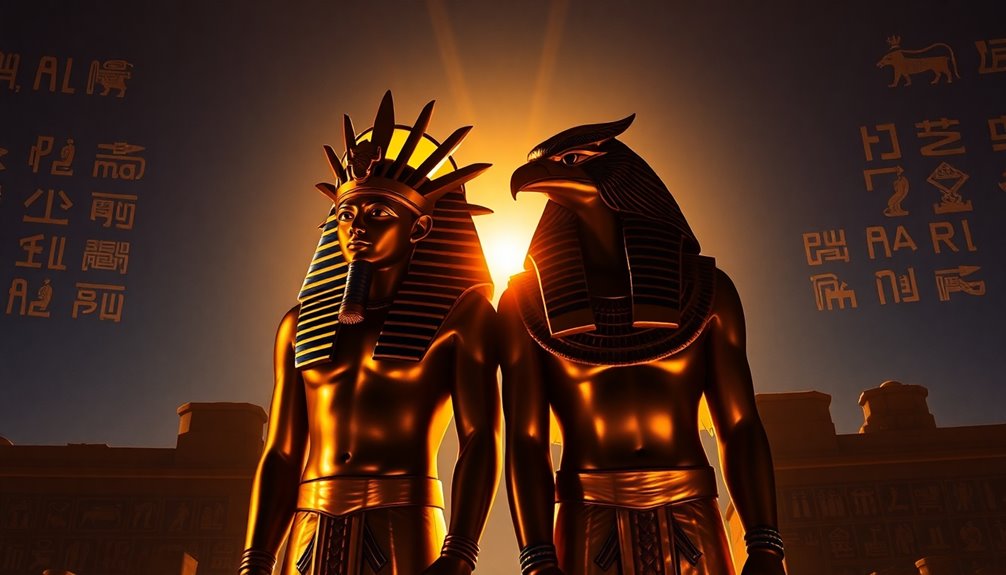
Symbolism plays an essential role in ancient mythology, offering insights into the beliefs and values of cultures. In Egyptian mythology, the gods Ra and Horus embody profound symbolism that reflects their significance.
Ra, the solar deity, is represented by the sun disk and the scarab beetle, symbolizing creation, light, and the cycle of life. On the other hand, Horus is often depicted as a falcon, symbolizing kingship, protection, and the sky.
The left eye of Horus symbolizes the moon and protection, while the right eye represents the sun, linking him directly to Ra. This duality emphasizes the balance between light and darkness in their mythology.
The artistic depictions of Ra sailing in solar boats and Horus engaged in battle underscore their respective roles in creation and governance.
Additionally, the Eye of Horus serves as an emblem of protection and health, illustrating how the eyes were powerful symbols against evil.
Together, the symbolism of these Egyptian gods highlights themes of order, power, and renewal, showcasing the intricate beliefs woven into the fabric of ancient Egyptian culture.
Religious Practices and Worship
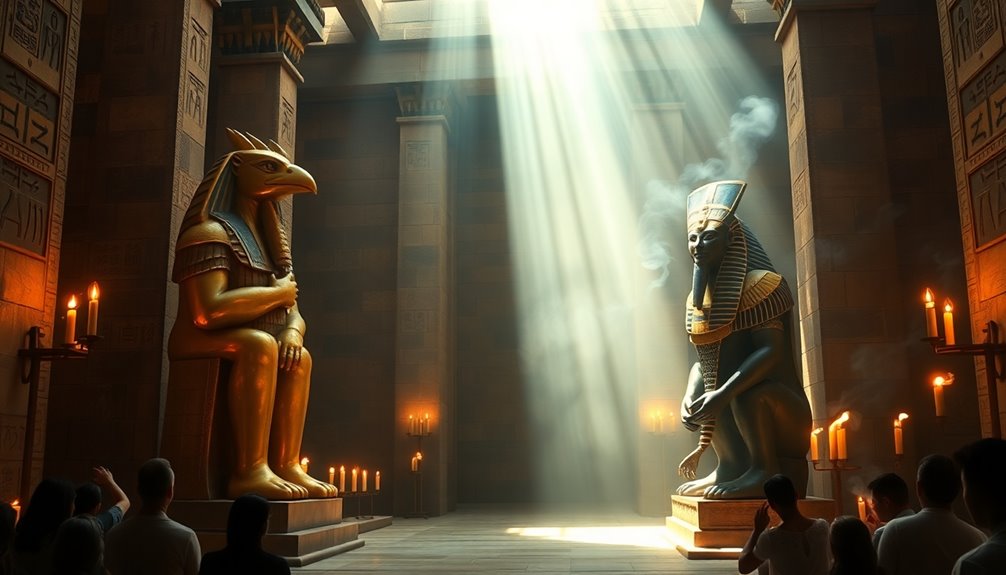
While ancient Egyptian religion revolved around numerous deities, Ra and Horus occupied pivotal roles in the worship practices of their time. Ra, the sun god, was central to elaborate rituals and festivals, especially during the Solstice. Temples in Heliopolis served as major sites for daily rites performed by priests to honor Ra, ensuring the sun's daily cycle and reinforcing his creation role.
On the other hand, Horus was revered as the protector of the pharaoh. His worship was integral to royal ceremonies, particularly during coronations, which affirmed the divine right of the pharaoh to rule. Temples dedicated to Horus, especially in Edfu, acted as community hubs where people gathered to participate in rituals emphasizing his significance in kingship and protection.
Both Ra and Horus worship reflected a syncretic approach, merging their attributes to promote societal order and stability. These rituals not only reinforced the power of the pharaoh but also fostered a sense of community among worshippers, uniting them in their devotion to these powerful gods.
In this way, worship of Ra and Horus became essential to the spiritual and political life of ancient Egypt.
Comparative Analysis of Deities
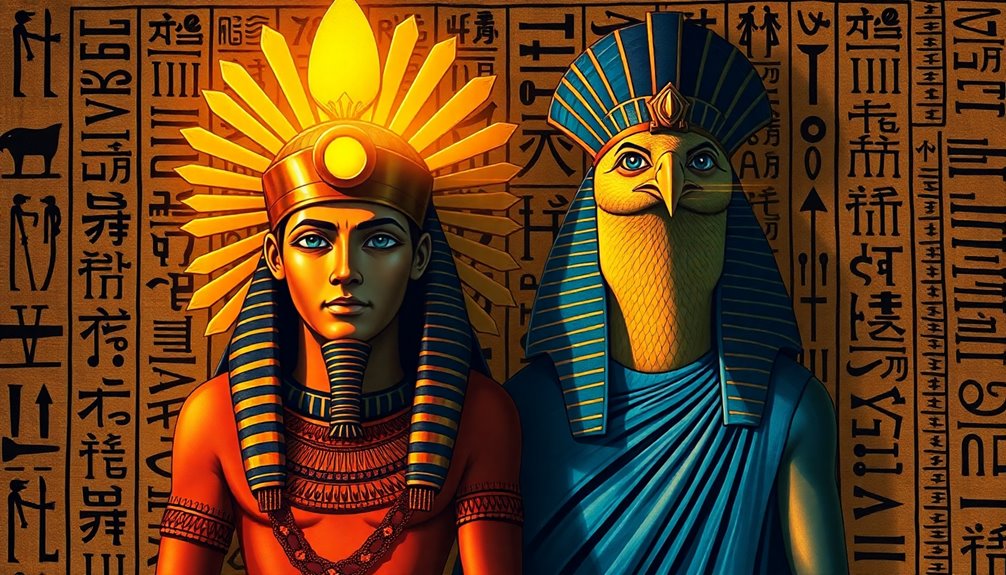
In ancient Egyptian mythology, Ra and Horus serve as two of the most significant deities, each embodying unique yet complementary roles within the pantheon. Ra, the sun god and creator, symbolizes light and creation, while Horus, the god of Kings, represents kingship and protection. Their interconnectedness is evident in the symbolism of their two eyes: Horus's left eye symbolizes the moon, while Ra's right eye represents the sun. This cosmic duality emphasizes their collective importance in maintaining order.
Horus, often depicted as a falcon, is the son of Isis and avenges Osiris, showcasing themes of resurrection and justice. In contrast, Ra's creation myths highlight his emergence from chaos, further reinforcing the identity theory that connects these two deities.
The Coffin Texts illustrate the significance of both gods in the afterlife, as they guide the deceased toward divine favor.
While Ra and Horus have distinct roles, their worship reflects broader themes of duality and unity in ancient Egyptian culture. You can see how their narratives and attributes intertwine, influencing the traditions that shaped a civilization and its understanding of divinity.
Legacy of Ra and Horus
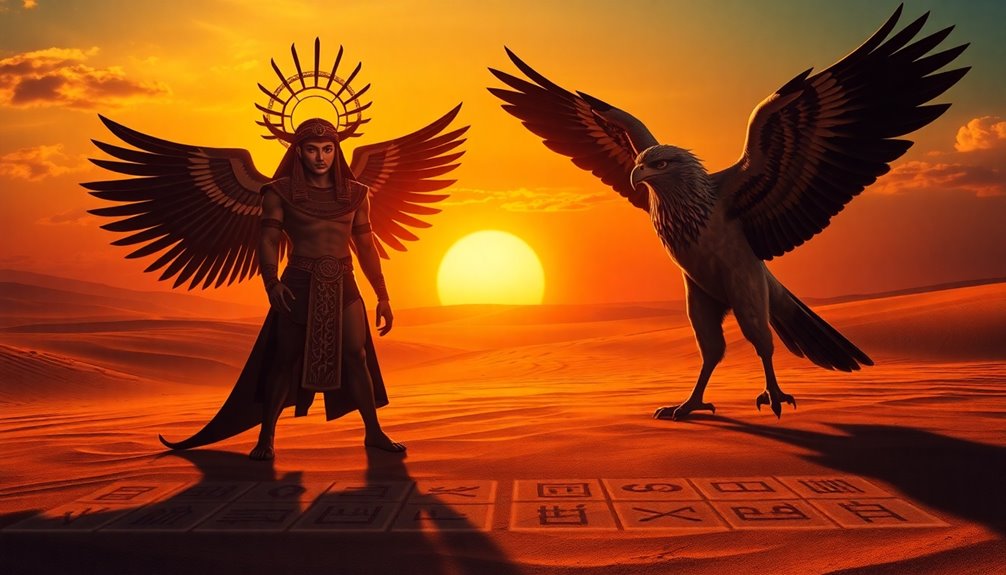
The intertwined narratives of Ra and Horus have left a lasting legacy that shaped ancient Egyptian culture and continues to resonate today. As you investigate their significance, you'll find that these powerful gods influenced various aspects of life, spirituality, and governance.
- Ra, the sun god, symbolized light and creation, central to Egyptian religious practices.
- Horus, the sky god, represented kingship and protection, essential in royal ceremonies and the concept of resurrection.
- Both deities appear prominently in the Book of the Dead, highlighting their protective roles in the journey of the soul.
Their legacies echo through time, with Ra's worship primarily in Heliopolis and Horus's in Edfu, showcasing their architectural and cultural importance.
The Eyes of Horus and Ra illustrate cosmic duality, linking both gods in a dance of protection and creation.
Today, their stories inspire modern spirituality, literature, and art, proving their enduring significance.
As you explore Egyptian mythology, you'll discover how Ra and Horus continue to influence beliefs and practices across civilizations, reminding us of the rich tapestry woven by these deities in the ancient world.
Frequently Asked Questions
Is Ra the Most Powerful Egyptian God?
You might think Ra is the most powerful Egyptian god, and many would agree. His influence as the sun god is unmatched, symbolizing life and creation.
With major temples dedicated to him and widespread worship, Ra plays a central role in Egyptian mythology.
However, don't overlook other gods like Isis and Horus, who also wield significant power in their own domains.
Is Ra One of the Most Powerful Gods?
You might wonder if Ra is truly one of the most powerful gods in Egyptian mythology. The answer is a resounding yes!
Ra's influence over creation and the sun grants him immense authority. Revered in temples across Egypt, his daily journey across the sky symbolizes life and order.
With the solar eye representing protection, Ra's role as a creator deity solidifies his status among the most powerful gods of ancient Egypt.
Which Egyptian God Is Most Powerful?
When you consider which Egyptian god is most powerful, think about the unique roles they play.
Isis often tops the list due to her unmatched cleverness and magical prowess.
Ra, as the sun god, shines brightly with his creator status, while Horus, embodying kingship and protection, holds sway over earthly authority.
Each god's power varies by context, so your answer might depend on the specific attributes or stories you find most compelling.
How Does Horus Compare to Ra?
When you compare Horus to Ra, you'll see distinct characteristics that highlight their roles in Egyptian mythology.
Horus, known for kingship and protection, embodies the ideal ruler, while Ra, the sun god, symbolizes creation and light.
Both deities are essential, with Horus representing order through his battles against chaos, and Ra signifying the life-giving power of the sun.
Their interconnectedness showcases the balance between protection and creation in ancient beliefs.
Conclusion
In the battle of divine power, both Ra and Horus shine brightly, each holding unique secrets that shaped ancient Egyptian beliefs. As the sun god, Ra represents creation and light, while Horus embodies kingship and protection. Their legacies remind us that "knowledge is power." By exploring their origins, symbolism, and worship, you uncover deeper insights into the complexities of ancient mythology. Ultimately, both gods continue to inspire, inviting you to seek the mysteries they guard.
